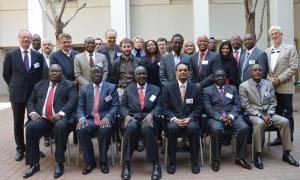A CALL FOR RESTORING THE SADC TRIBUNAL - Rule of Law Programme Sub-Saharan Africa (Anglophone Countries)
Event Reports
REPORT ON THE ROUND TABLE DISCUSSION ON THE RESTORATION OF THE SADC TRIBUNAL HELD AT CENTRE FOR HUMAN RIGHTS, FACULTY OF LAW, UNIVERSITY OF PRETORIA 28 - 29 AUGUST 2014
The Centre for Human Rights, Faculty of Law, University of Pretoria, in collaboration with the Konrad Adenauer Stiftung’s Rule of Law Program for Sub Saharan Africa held a two-day Round Table to discuss the restoration of the Southern African Development Cooperation (SADC) Tribunal in Pretoria, South Africa.
The main objective of the forum was to discuss the implications of the adoption of a new Protocol by the SADC Summit.
At its most recent session held on 18 August 2014, at the Victoria Falls, Zimbabwe, the SADC Summit adopted the new Protocol on the SADC Tribunal, which inter alia, bars individuals from accessing the Court. Article 33 provides that, ‘The Tribunal shall have jurisdiction on the interpretation of the SADC Treaty and Protocols relating to disputes between Member States’ effectively limiting access to the Tribunal to States only. 8 out of the 15 member States have signed the new Protocol which will come into force upon ratification by at least two-thirds (10 member states).
The forum raised the following concerns,
•That in the recent past, the SADC Summit has made a number of decisions regarding the SADC Tribunal that have severely undermined, if not destroyed, the rule of law in the Southern Africa region;
•That once operational, the new Protocol will deprive the people of SADC access to the SADC Tribunal, which contradicts the global trend including experience with other African sub-regional communities and the African Court on Human and Peoples’ Rights;
•That Tanzania and Malawi have created a perplexing anomaly by accepting direct access to the African Court; and Tanzania has also accepted direct access to the EAC Court without the requirement of the exhaustion of local remedies yet the same is denied in regards to the SADC Tribunal;
•That the process of abolishing the defunct Tribunal and subsequent negotiation and adoption of the new Protocol was not transparent and excluded SADC citizens contrary to the letter and spirit of the SADC Treaty, which commits to fully involve the people and the key stakeholders in the process of regional integration;
•That prior to its disbandment, the SADC Tribunal had received 30 cases all filed by individuals and not the member States, and six of them remained unresolved;
•That Sub-regional courts allow access to their employees to settle their disputes with them (as employers), which the SADC Tribunal had initially allowed but was negated by the abolishment of individual access thereby denying employees avenue for legal recourse. While the SADC Summit mandated the establishment of an ad hoc Administrative Tribunal to deal with these disputes, the establishment of such a body leads to an anomaly that some, but not all individuals have access to judicial recourse with SADC.
The forum identified both legal and political challenges and the available opportunities that could be explored in addressing the challenges affecting the regional Court. It further observed that the rule of law is a basic feature of a democratic society and one of the core elements of the rule of law is access to justice.
Legally, the forum noted that,
•The suspension of the Tribunal lacked legality as the SADC Treaty does not allow for suspension and therefore, the SADC Summit did not act in accordance with its own procedures, which allow for amendment of the Treaty;
•The SADC Treaty and Protocols foresee the role of the SADC Tribunal in their ‘applications, interpretation and implementation’. When a dispute on these issues cannot be settled amicably (see for examples, article 36(2) of the SADC Protocol on Gender and Development; article 22 of the SADC Protocol against Corruption; article 30 of the SADC Protocol on Health), these disputes may, logically, be brought by individuals. In the absence of individual access to the SADC Tribunal, these provisions are rendered inoperable.
In order to address this challenge, the forum proposed that,
•An advisory opinion from the African Court on Human and Peoples’ Rights could be sought;
•Cases may be filed at the domestic level, to argue that the abolition of individuals’ access violates domestic constitutional law;
•Individuals in Tanzania and Malawi could file a case before the African Court on the basis of violation of the SADC Treaty once domestic remedies have been exhausted.
Politically, the forum observed that,
•Key players such as the Heads of State, domestic parliaments and the SADC Council of Ministers could be lobbied not to ratify the new Protocol;
•A coalition for the Restoration of the SADC Tribunal, comprising of all SADC countries, should be formed, to bring together various stakeholders and institutions to work towards the common objective. The coalition should lodge a campaign to identify politicians to argue against the ratification of the new Protocol at the domestic level of each SADC member states, and support them through legal arguments;
•Strong civil society coalitions to be built to raise awareness among SADC citizens about the need for individual access.
In conclusion, the forum resolved as follows;
•The Heads of State and Government of SADC Member States to reconsider their decision concerning the suspension of the SADC Tribunal and the adoption of the new Protocol;
•The SADC citizens should reject and protest against the decisions of the Summit from August 2010 to August 2014, including, through the petitioning of their respective parliaments;
•The SADC Heads of State and Government and all institutions of SADC should, in consultation with all stakeholders as provided for in the SADC Treaty, immediately embark on the revision of the SADC Treaty to strengthen and democratise SADC institutions including the SADC Secretariat; establishing a regional parliament with law making powers; creating a regional court with adequate jurisdictional powers and the right to access by individuals;
•The SADC Ministries of Justice who have been mandated to propose a mechanism for the resolution of pending cases, and to report to the SADC Summit by August 2015; should ensure that the process of establishing a mechanism for pending cases is transparent and participatory in line with article 23 of the SADC Treaty.
•The restoration of individual access to the SADC Tribunal should be reinstated in order to enable the Tribunal to dispense justice for the people of the region.
The forum was attended by inter alia, former judges of the SADC Tribunal; a former Judge President of the East African Court of Justice (EACJ); Registrar of the SADC Tribunal, Registrar of EACJ and senior official from the Economic Community of Western African States (ECOWAS) Court of Justice; lawyers from private and academic practice and officials from the Ministry of Justice, South Africa; the Human Rights Commission South Africa; researchers; and members of the civil society.
Media library
Topics
Fico pushes through controversial criminal law reform - and thus unites the opposition
Senegal's democracy passes the stress test
Between dialogue and resistance The conflict on the final word in the European judicial order
Ecuador: Muerte Cruzada Keeps President Guillermo Lasso in Office
Nach der Reform ist vor der Reform






